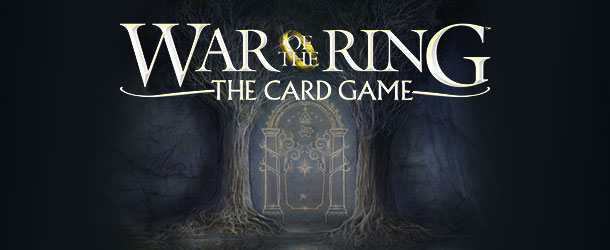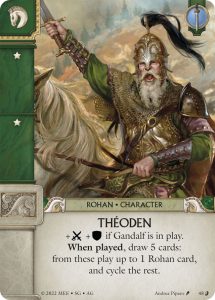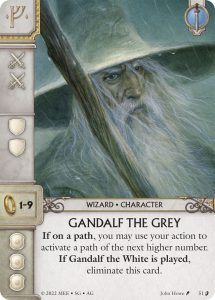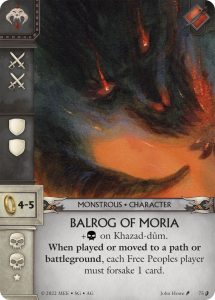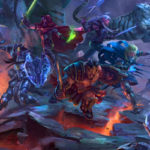One of the key mechanics of War of the Ring - The Card Game is the process of forsaking a card. When you’re told to forsake a card, it means you must choose one of your cards to eliminate, either from your hand, from your reserve, or from the top of your draw deck, which is unknown. Cards that are eliminated are out of the game for good, so it’s important to make the right choice!
It should be noted that if you’re totally out of cards in hand and in reserve, you’ve no choice - you must forsake from the top of the deck. You may want to avoid putting yourself in this situation!
If, however, you do have a choice... in this article you will find some suggestions for making a good one.
Unequal Impacts
In War of the Ring - The Card Game, decks are very different, and you will face different situations depending on the deck you're playing with:
- The Witch-king: Forsaking cards from the top of the deck after the first recycle is generally pretty easy. You don’t want to lose Grond or the Mouth of Sauron, but you have lots of fodder. Of course, a commander with complete disregard for the lives of his soldiers may still find his ranks quite thin at game end.
- Saruman: By design, the Saruman deck may almost disappear by end game. Every so often you might run out of cards, but by the time you do it, hopefully it doesn’t matter. I do like to try to get Gollum out every round possible – he’s the one late game card that’ll keep you from discarding from the top.
- Frodo: The Hobbits have an innate resistance to death and despair which gives them ways to avoid the dead pile – and helps keep you from running low on cards. However, the deck has a few key cards that make forsaking off the top of the deck super risky. A significant challenge for Frodo is how the Rohan cards make it tricky for you to ensure you pull the most important cards from your deck prior to recycling.
- Aragorn: The Dúnedain and the Elves are the diminishing races of Middle Earth, and the Free Peoples factions most prepared for the coming war. This player is highly vulnerable to being decked by a heavy forsake strategy by the Shadow, but also has ways of mitigating the effects, like the Mirror of Galadriel, and a few “Born to Lose” cards, like Denethor.
Tempo
Without looking at the cards carefully, one might believe that losing a card from the draw deck would be the best option, to maximize card play tempo.
First, consider the following: If you have 4 cards in hand and must forsake, and assuming you do not expect to draw or discard more cards from hand, you can generally take one out from hand unless all four cards are awesome. After all, the card you’re losing is the worst of 4. If those 4 cards are a good representation of the deck, then that puts the card you lost in the bottom 25%, likely worse than the top card of your draw deck. Meanwhile, with 3 cards left, you can still take 2 actions, and lose that top card after all, but at least you are not required to do so. Furthermore, by losing a card in hand, you may force the other team to play earlier in the round, which is usually a good thing. The same concept goes for having only 2 cards in hand, but much more frequently it will be difficult to choose a loser among them.
Barring the above conditions, and without considering special effects, the baseline effect of a “regular” card in hand is to add one symbol, or a half symbol if you consider the fact that you’re having to cycle a card. Playing a card that adds two symbols effectively doubles your tempo, if both symbols are useful.
A card in reserve’s symbols have already been paid, so ditching a card in reserve has the most negative tempo effect – but don’t fall into the trap of considering “sunk cost”. The card you spent to get it into reserve is long gone, and you are where you are now. It usually isn’t hard to figure out what cards you can lose from reserve, but sometimes there are “hidden losers”.
Why NOT lose the cards from the draw deck?
If you lose a 2-symbol card off the top of your deck to play a 1 symbol card, then you’ve reduced your tempo. Of course, the cards have a lot more effects, and the unique power of certain cards (e.g., Gandalf the Grey) means that you might end up crushing your game with a bad discard, since he can easily be worth more than 3 or 4 “symbols” due to his ability to move forward.
The forsake mechanism relies on players making it through their entire deck and having cards of varying potency, and without (much) duplication, but also without requiring any one card to win. You definitely can win without playing Gandalf the Grey, it’s just harder.
If you believe you can win the game on skill, forsake from your draw deck carefully, at least until you’ve cycled once. Carelessly discarding from the top of your draw deck may be regularly increasing your tempo, but it’s likely you’ll end up losing just too many good cards and hand the game to the opponent – it is a high risk / high reward tactic. This is truer for the Free Peoples, by design - as a newbie Shadow player, you can be a bit less cautious, especially when it comes to earning Victory Points.
When you recycle, if you have a moment, quickly scan your cards for unplayed key cards that will be in your draw deck. Maybe you can afford to lose these cards, but if there are some “can’t lose” cards in there, you again will want to show care in the how you forsake. Finally, sometime around path 7 or 8 you’ll probably stop worrying about it too much when you realize that you won’t make it through your deck again.
Attacking with the Shadow
For the Shadow, a strategy focused on forcing the Free Peoples to forsake is up to Saruman player to pursue, in consultation with the Witch-king.
Naturally, forcing the Free Peoples to forsake in early rounds is highly disruptive. However, it’s a strategy that may take a while to bear fruition, and the Shadow can lose by a 10 point auto-victory if only playing the long game.*
The tricky part is knowing if you can avoid a Free Peoples auto-victory by path 5 to pursue this strategy, so your decision will be partially based on which battlegrounds are drawn in the first round, and of course the cards you’ve drawn.
There are pros and cons to using forsake cards earlier vs. later in a round. Early in the round, the Free Peoples players may identify some losers in hand, and they’ll not really have lost much, except perhaps tempo, if even that. However, if both Shadow players can force each Free Peoples player to forsake twice or more in a row, it can be quite effective.
If you, as the Shadow, realize you can’t compete on any path or battleground, I think it makes sense to save the forsake cards towards the end of the round, so as to surprise the Free Peoples and hopefully force some good cards into the eliminated pile. (Since they don’t have to reveal what they’ve lost, it is worth asking the Free Peoples players to loudly groan and sigh each time you make them forsake so you won’t be able to figure out what happened, but at the same time will feel good about having done it – a win/win.)
If you do intend to fight on some battlegrounds, especially as a surprise for the Free Peoples, you might want to make the Free Peoples forsake early in the round – for example, if you intended to use Threats and Promises later in a round, you might force a forsake, hoping the Free Peoples will eliminate a Rohan card that could be used in defense.
The big change, when attempting this strategy, is that you will have hard decisions about playing certain cards that you would normally not, like the Barrow-wights after path 2 – I mean, it’s not an amazingly powerful play, but the more cards you force from your opponent, the more good cards you’ll take out, and might be better than other choices.
I hope this was of some help!
* One of the reasons the Shadow players are compelled to make some less than ideal attacks early in the game is to reflect Sauron’s mind. He’s not waiting for a bunch of characters to wander into Mordor. He’s expecting someone like Gandalf, Galadriel, or Aragorn to put the ring on and take Middle-earth for themselves. I wanted to put this sense of urgency into the game so that there would be far more locations that were contested. Otherwise, the Shadow would just wait until path 6 to ever bother with the Fellowship!
This article was originally posted in the War of the Ring - Card Game forum on BGG.

